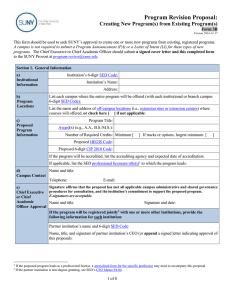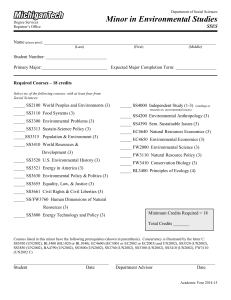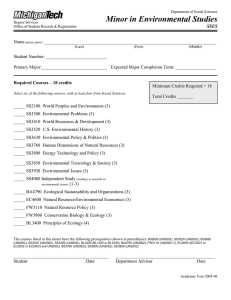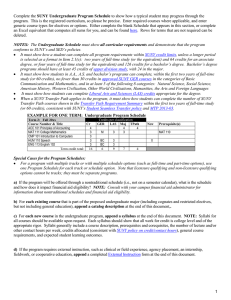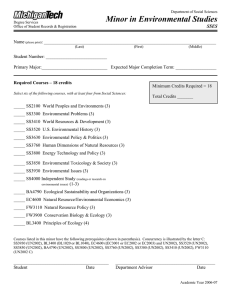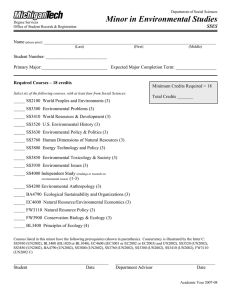3B Program Revision Proposal: Creating a New Program from Existing Programs
advertisement
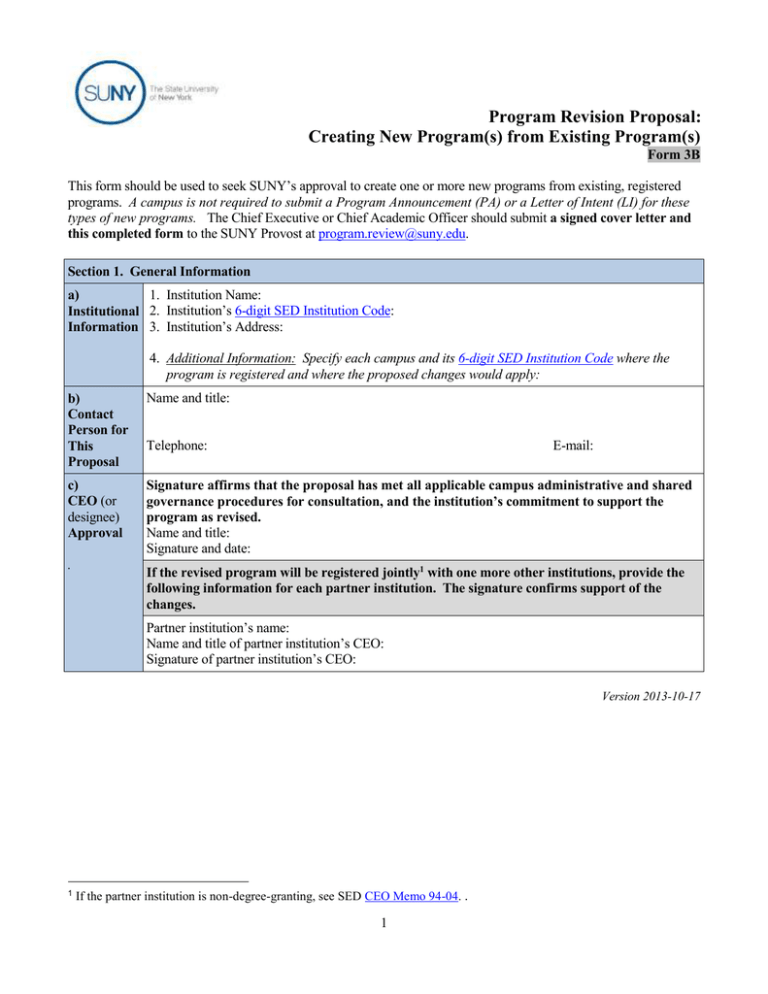
Program Revision Proposal: Creating New Program(s) from Existing Program(s) Form 3B This form should be used to seek SUNY’s approval to create one or more new programs from existing, registered programs. A campus is not required to submit a Program Announcement (PA) or a Letter of Intent (LI) for these types of new programs. The Chief Executive or Chief Academic Officer should submit a signed cover letter and this completed form to the SUNY Provost at program.review@suny.edu. Section 1. General Information 1. Institution Name: a) Institutional 2. Institution’s 6-digit SED Institution Code: Information 3. Institution’s Address: 4. Additional Information: Specify each campus and its 6-digit SED Institution Code where the program is registered and where the proposed changes would apply: b) Contact Person for This Proposal Name and title: c) CEO (or designee) Approval Signature affirms that the proposal has met all applicable campus administrative and shared governance procedures for consultation, and the institution’s commitment to support the program as revised. Name and title: Signature and date: . If the revised program will be registered jointly1 with one more other institutions, provide the following information for each partner institution. The signature confirms support of the changes. Telephone: E-mail: Partner institution’s name: Name and title of partner institution’s CEO: Signature of partner institution’s CEO: Version 2013-10-17 1 If the partner institution is non-degree-granting, see SED CEO Memo 94-04. . 1 Section 2. Multi-Award and Multi-Institution Programs Check one. [ ] This proposal is for a multi-award program that leads to two separate awards (e.g., A.S./B.A., B.S./M.S.). Complete Part 2A, below. NOTE: Such programs generally involve special admissions for students who have the capacity to complete all awards, curricular integration between the component programs, and shortened time to degree compared to taking the programs separately. [ ] This proposal is for a multi-institution program (also called a “jointly registered program”) to be offered jointly by two or more institutions. Complete Part B, below. NOTE: Such programs involve a formal agreement between two or more institutions to offer courses leading to an award. [ ] This proposal is for a multi-institution, multi-award program to be offered jointly by more two or more institutions and lead to two separate awards. Provide a single, consolidated response that reflects all the items in Parts 2A and 2B, below. PART 2A – Multi-Award Program a) Program Title: b) Program Awards ((e.g., B.A./M.S.) from existing programs): c) Proposed HEGIS Code: d) Required Number of Credits: Minimum [ e) Format: [ ] Day [ ] Evening ] If tracks or options, largest minimum [ [ ] Weekend [ ] Evening/Weekend ] [ ] Not Full-Time f) Mode: [ ] Standard [ ] Independent Study [ ] External [ ] Accelerated [ ] Distance Education (If 50% of more of the program can be completed via distance education, append a Distance Education Format Proposal at the end of this form.) g) Other: [ ] Bilingual [ ] Language Other Than English [ ] Upper Division Program [ ] Cooperative 4.5 year [ ] 5 year h) List registered programs at the institution identified in Section 1 whose courses will contribute to this program. Add rows as needed. Program Title Award SED Program Code Program 1 Program 2 i) List all the courses required for each existing program, and indicate which ones will be counted toward both awards. j) What is the length of time students will have to complete the proposed program? 2 k) What are the admissions requirements for the new program, and how are they related to student success? l) Complete a SUNY Sample Program Schedule to show how students will be able to schedule all required courses to complete the multi-award program. PART 2B – Multi-Institution Program a) Program Title: b) Are all partner institutions listed in Section 1, with CEO information and a signature for each partner? [ ] Yes [ ] No c) Proposed HEGIS Code: g) Required Number of Credits: Minimum [ d) Format: [ ] Day [ ] Evening ] If tracks or options, largest minimum [ [ ] Weekend [ ] Evening/Weekend ] [ ] Not Full-Time e) Mode: [ ] Standard [ ] Independent Study [ ] External [ ] Accelerated [ ] Distance Education (If 50% of more of the program can be completed via distance education, append a Distance Education Format Proposal at the end of this form.) f) Other: [ ] Bilingual [ ] Language Other Than English [ ] Upper Division Program [ ] Cooperative 4.5 year [ ] 5 year g) List all courses in the program and indicate which courses will be completed at each institution. h) Describe the administrative provisions for coordinating admissions, advisement and financial aid for the program between the two institutions. i) Describe the program’s policies governing residency requirements and tuition charges. j) Explain any other special arrangements or requirements arising from the multi-institution nature of the program. k) Complete a SUNY Sample Program Schedule to show how students will be able to schedule all required courses to finish the program. 3 Section 3. New Programs from Options, Concentrations or Tracks in an Existing Program This section should be used to propose the creation of new programs from options, concentrations or tracks in existing, registered programs, which is sometimes called “disaggregation.” This section enables (but does not require) a campus to make the following types of revisions to an existing track at the same time the track becomes a separate program: new or significantly revised courses; and changes to the track’s admissions standards and program evaluation elements. NOTE: A new program proposal must be submitted – instead of this section – when: the new program(s) will be offered at a different location than the campuses identified in Section 1; or a Master Plan Amendment is required for the new program(s). PART 3A – REVISION OF EXISTING PROGRAM a) Title: b) Award: c) HEGIS Code: d) SED Program Code: e) List the registered Options, Concentrations or Tracks and indicate which, if any, will be removed. f) If the existing program will have any changes to the program’s admissions standards or program evaluation elements, please describe them and explain why they are needed. Otherwise, affirm that the admissions standards and evaluation methods are unchanged from the current registered program. PART 3B – PROPOSED NEW PROGRAM(S) Provide the information requested below for each proposed new program to be registered separately. a) Title: b) Award: c) HEGIS Code: d) Required Credits: Minimum [ ] If tracks or options, largest minimum [ ] e) Describe the new program and the rationale for converting the existing coursework to a separately registered program. f) If the new program will have any new or significantly revised courses, list them here and attach a syllabus for each one. g) If the new program will have any changes to the program’s admissions standards or program evaluation elements, please describe them and explain why they are needed. Otherwise, affirm that the admissions standards and evaluation methods are unchanged from the current registered program. h) Explain the expected impact of the new program on existing programs. i) Describe adjustments the institution will make to its current resource allocations to support the new program. j) Complete the appropriate Sample Program Schedule to show how students can complete all required courses in the new program. 4 SUNY Undergraduate Sample Program Schedule OPTION: You can paste an Excel version of this schedule AFTER this line, and delete the rest of this page.) Program/Track Title and Award:______________________________________________________ a) Indicate academic calendar type: [ ] Semester [ ] Quarter [ ] Trimester [ ] Other (describe): b) Label each term in sequence, consistent with the institution’s academic calendar (e.g., Fall 1, Spring 1, Fall 2) c) Name of SUNY Transfer Path, if one exists: _______________________________________ See Transfer Path Requirement Summary for details. d) Use the table to show how a typical student may progress through the program; copy/expand the table as needed. Complete all columns that apply to a course. Cr See KEY. GER LAS Maj TPath New Co/Prerequisites Term credit totals: See KEY. Term 3: Course Number & Title Cr GER LAS Maj TPath New Co/Prerequisites Term credit totals: Term 4: Course Number & Title Cr See KEY. GER LAS Maj TPath New Co/Prerequisites Term credit totals: See KEY. Term 5: Course Number & Title Cr GER LAS Maj TPath New Co/Prerequisites Term credit totals: Term 6: Course Number & Title Cr See KEY. GER LAS Maj TPath New Co/Prerequisites Term credit totals: See KEY. Term 7: Course Number & Title Cr GER LAS Maj TPath New Co/Prerequisites Term credit totals: Term 8: Course Number & Title Cr See KEY. GER LAS Maj TPath New Co/Prerequisites Term 1: Course Number & Title Cr GER See KEY. LAS Maj TPath New Co/Prerequisites Term 2: Course Number & Title Term credit totals: Program Totals (in credits): Term credit totals: Total Credits: SUNY GER: LAS: Major: Elective & Other: Upper Division: Upper Division Major: Number of SUNY GER Categories: KEY Cr: credits GER: SUNY General Education Requirement (Enter Category Abbreviation) LAS: Liberal Arts & Sciences (Enter credits) Maj: Major requirement (Enter credits) TPath: SUNY Transfer Path Courses (Enter credits) New: new course (Enter X) Co/Prerequisite(s): list co/prerequisite(s) for the noted courses Upper Division: Courses intended primarily for juniors and seniors SUNY GER Category Abbreviations (the first five listed in order of their frequency of being required by SUNY campuses): Basic Communication (BC), Math (M), Natural Sciences (NS), Social Science (SS), Humanities (H), American History (AH), The Arts (AR), Other World Civilizations (OW), Western Civilization (WC), Foreign Language (FL). 5 SUNY Graduate Sample Program Schedule OPTION: You can insert an Excel version of this schedule AFTER this line, and delete the rest of this page.) Program/Track Title and Award:________________________________________________________ a) Indicate academic calendar type: [ ] Semester [ ] Quarter [ ] Trimester [ ] Other (describe): b) Label each term in sequence, consistent with the institution’s academic calendar (e.g., Fall 1, Spring 1, Fall 2) c) Use the table to show how a typical student may progress through the program; copy/expand the table as needed. d) Complete the last row to show program totals and comprehensive, culminating elements. Complete all columns that apply to a course. Term 1: Term 2: Course Number & Title Credits New Co/Prerequisites Course Number & Title Term credit total: Credits New Co/Prerequisites Credits New Co/Prerequisites Credits New Co/Prerequisites Credits New Co/Prerequisites) Term credit total: Term 3: Term 4: Course Number & Title Credits New Co/Prerequisites Course Number & Title Term credit total: Term credit total: Term 5: Term 6: Course Number & Title Credits New Co/Prerequisites Course Number & Title Term credit total: Term credit total: Term 7: Term 8: Course Number & Title Credits New Co/Prerequisites Course Number & Title Term credit total: Program Total: Total Credits: Term credit total: Identify the required comprehensive, culminating element(s), such as a thesis or examination, including course number(s), if applicable: New: X if new course Prerequisite(s): list prerequisite(s) for the noted courses 6 Section 4. SUNY Faculty Table a) If applicable, provide information on faculty members who will be teaching new or significantly revised courses in the program. Expand the table as needed. b) Append at the end of this document position descriptions or announcements for each to-be-hired faculty member. (a) Faculty Member Name and Title and/or Rank at the Institution (Include and identify Program Director.) PART 1. Full-Time Faculty (b) % of Time Dedicated to This Program (c) Program Courses Which May Be Taught (Number and Title) (d) Highest and Other Applicable Earned Degrees (include College or University) Part 2. Part-Time Faculty Part 3. To-Be-Hired Faculty (List as TBH1, TBH2, etc., and provide expected hiring date instead of name.) 7 (e) Discipline(s) of Highest and Other Applicable Earned Degrees (f) Additional Qualifications: List related certifications and licenses and professional experience in field.
